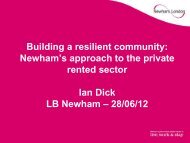View publication - Chartered Institute of Housing
View publication - Chartered Institute of Housing
View publication - Chartered Institute of Housing
Create successful ePaper yourself
Turn your PDF publications into a flip-book with our unique Google optimized e-Paper software.
PART ONE: LEARNING TODAY<br />
<strong>Housing</strong> staff should also be, where appropriate, familiarising themselves with assistive<br />
technology, particularly telecare. Such technology <strong>of</strong>fers many people the opportunity to<br />
continue to live independently.<br />
And lastly, if housing is to work effectively with its partners, and make the case to<br />
organisations such as HWBs for policies that reflect the impact and potential <strong>of</strong> housing<br />
for both good and ill, I firmly believe that the sector needs to develop its leadership<br />
skills. There has been significant investment in leadership in both the NHS and social<br />
care over the last decade. Where is the housing industry’s equivalent <strong>of</strong> the NHS<br />
Leadership Academy?<br />
Key points<br />
• The health and social care landscape is changing and this has placed new<br />
demands on skills and learning requirements for the housing industry.<br />
• Produce a clear vision on how your organisation can best promote the<br />
health and wellbeing needs <strong>of</strong> residents, for example, understanding your<br />
residents’ pr<strong>of</strong>ile (age and health status) to inform local housing choices<br />
including access to accessible and adaptable properties.<br />
• Build in sufficient staff time to ensure effective and proactive engagement<br />
with key health and social care decision-making and commissioning<br />
processes, for example, influence Health and Wellbeing Boards, Clinical<br />
Commissioning Groups, public health agenda to tackle local health<br />
inequalities or ill health.<br />
• Demonstrate the person-centred outcomes <strong>of</strong> your services and provide<br />
evidence <strong>of</strong> their effectiveness, for example, your services can prevent,<br />
reduce or delay more costly care interventions or hospital admissions/<br />
readmissions.<br />
• Develop joint training, workforce or leadership programmes to break<br />
down cultural and/or organisation boundaries, for example, use <strong>of</strong><br />
language, understanding clinical care pathways around long term<br />
conditions management such as dementia.<br />
• Get involved in networks locally that can help you share good practice,<br />
develop your learning and enable you to acquire relevant knowledge or<br />
key skills to align your work across more integrated housing, health and<br />
social care systems.<br />
48

















